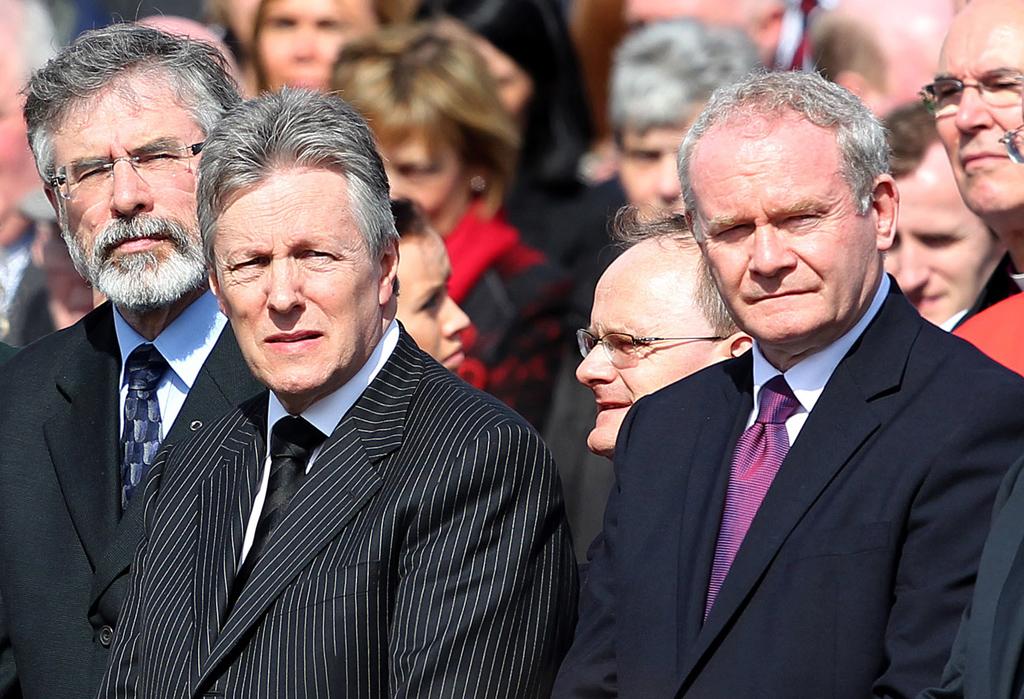Northern Ireland confirms its support of power-sharing government
Sinn Fein President Gerry Adams (left), Northern Ireland First Minister Peter Robinson (middle) and Deputy First Minister Martin McGuiness stand together as the coffin containing the remains of Police Constable Ronan Kerr is carried from the church of the Immaculate Conception in Beragh, Northern Ireland, on April 6, 2011.
DUBLIN, Ireland — This week's election for the power-sharing assembly in Northern Ireland shows that the population strongly supports its unique political experiment, which ended decades of conflict.
Both the Democratic Unionist Party (DUP) and Sinn Fein increased their share of the vote to remain the largest and second-largest parties, respectively. Smaller unionist parties that opposed the power-sharing agreement saw a drop in their support.
The new assembly will be ruled, as before, by a multi-party executive headed by First Minister Peter Robinson of the DUP and Deputy First Minister (with equal ranking) Martin McGuinness of Sinn Fein.
The DUP supports continued membership in the United Kingdom and Sinn Fein favors a united Ireland.
“People are generally content with the way things are,” said Robinson as he watched his votes pile up in the East Belfast constituency counting center.
Speaking at the mid-Ulster count in Dungannon where he too was re-elected, McGuinness said, “The last year has seen a dramatic improvement in the working relationship between Sinn Fein and the DUP, and the electorate has endorsed that.”
The genius of the power-sharing arrangement, which evolved from long negotiations involving local parties and the British, Irish and U.S. governments, is that each side can claim progress in the historic battle for Northern Ireland’s future.
McGuinness pointed out Friday that increased contacts and cooperation between Belfast and Dublin and the presence of Sinn Fein in the parliaments of both parts of Ireland meant that its policy of promoting a united Ireland is working.
Paul Frew, a successful DUP candidate in North Antrim, said the election was for the future well-being of Northern Ireland, adding, “This is not a battle about keeping the union with Britain, that battle has been fought and won.”
During The Troubles from the late 1960s to the mid-1990s, elections in Northern Ireland were bitterly fought sectarian headcounts, with the majority Protestant population voting for union with Great Britain and Catholics supporting a united Ireland. The present arrangements for sharing power were completed with the devolution of policing and justice powers by London in 2009.
As the results were announced there were handshakes between opposing candidates rather than harsh words and jeering as in the past, and television and radio coverage was dominated by the economy rather than the constitutional issue. This in itself was evidence that the transformation in Northern Ireland politics is profound and lasting.
Once sworn enemies, Robinson and McGuinness have formed a close personal and working relationship and face a five-year term in office together. Last month McGuinness, a former IRA commander, attended the funeral of the mother of Robinson’s wife, Irene, and received a courteous welcome. Robinson, once strongly opposed to sharing office with nationalists, said of his support for joint government, “We recognize that because of the divisions we have had so long in Northern Ireland there is merit in having a system all sections of the community can buy into.”
The Ulster Unionist Party (UUP), which ruled Northern Ireland for half a century and which opposes the power-sharing system, has been in decline and suffered further losses in Thursday’s vote. The UUP, the nationalist Social Democratic and Labour Party (SDLP), and the Alliance Party make up the other main parties in the 108-member assembly.
The small Alliance party draws support from both communities and one of its candidates, Hong Kong-born Anna Lo, topped the poll in South Belfast.
In a mark of recent immigration to Northern Ireland, there was also one Polish and one Portuguese candidate
No candidates in the election expressed support for dissident republicans who have recently staged attacks on members of the police force.
Voting turnout was down from 60 to 50 percent, partly due to heavy rain Thursday that followed a month-long dry spell. In Derry some rain-soaked votes had to be dried with hairdryers.
Politicians from all sides complained about the slowness of the complicated count, which could continue until Monday before the last few seats in the assembly are allocated. Under the single transferable vote system, every elector in the 18 multi-member constituencies has a single vote which can be transferred from one candidate to another to ensure it is not wasted. Voters mark candidates in order of preference.
Every day, reporters and producers at The World are hard at work bringing you human-centered news from across the globe. But we can’t do it without you. We need your support to ensure we can continue this work for another year.
Make a gift today, and you’ll help us unlock a matching gift of $67,000!
